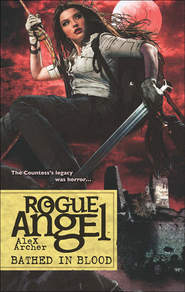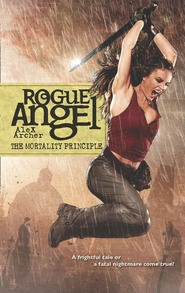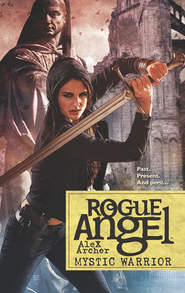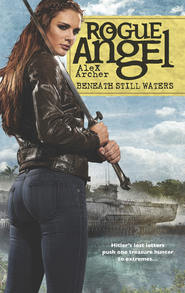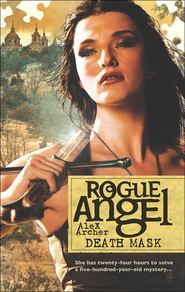По всем вопросам обращайтесь на: info@litportal.ru
(©) 2003-2024.
✖
City Of Swords
Автор
Год написания книги
2019
Настройки чтения
Размер шрифта
Высота строк
Поля
“I suspect that means you surrender.” Annja willed the sword away and, despite her pain, shoved the man toward the wall.
In the shadows there, Annja found her purse, which she had dropped when she’d picked the fight with the first youth. She grabbed it, took her cell phone out and called the police, quickly explaining in French that she’d been accosted by a Roma gang and that some vigilantes came to her aid. The tale was half-true. Prodding the man to stay ahead of her, she nudged him toward her shoes, which she gingerly put on. Then she directed him to sit near one of his fallen fellows.
“Wait,” she told him. “Do you understand English? French?”
He nodded.
“Wait for the police.”
When she could hear sirens, she returned to the shadows, following the wall back to the old train station. And toward where she had earlier sensed someone else watching her.
“Roux.”
“You’re hurt.”
“I’ll heal.”
“Rather quickly no doubt.”
The wail of the sirens grew louder. Annja glanced toward the men, making sure none of them had bolted.
“And what was all of that for, Annja Creed?”
She touched her arm, feeling the sting from the bullet and the warmth of her blood. There was a first-aid kit in her suitcase at the hotel; she always traveled with one.
They kept close to the front of the massive Gare du Nord. The original train station had been demolished a century and a half ago, deemed too small. This huge affair, built in its place, had been recently added to. Designed by French architect Jacques Ignace Hittorff, it was one of Annja’s favorite places in Paris, the facade created around a triumphal arch, the main cast-iron support beams supplied by an ironworks in Glasgow. In daylight, you could see eight statues along the building’s cornice, each representing international destinations—London, Brussels, Vienna, Warsaw, Frankfurt, Amsterdam, Berlin, Cologne. Annja and Roux passed beneath the one representing Vienna.
The station served all of northern Europe, so was a beehive of activity around the clock...though not so much outside the building this time of night. Well past midnight now, there were a few souls about, some gaping down the street in the direction of the downed gang.
From the cover of their vantage point, she and Roux watched as a police car arrived, its flashing ice-blue lights cutting through the thinning fog. A van pulled in behind it and policemen spilled out. Like swarming ants, they took control of the Romanies, lifting the unconscious forms and handcuffing the older one. Annja couldn’t hear what they were saying, but the older man pointed with his head toward the shadows and the train station.
Annja started to move again, as fast as she dared without drawing attention. She pulled Roux along with her.
They reached the far end of the station and turned the corner.
“Didn’t want to stick around and explain yourself to the police?”
“I’ll be in France for the better part of another week,” Annja said, changing the subject.
“Certainly enough time for you to pick another fight with the Romany gangs.”
She didn’t bother to answer that.
“More of the underground? For your television program?”
How did Roux know—? Stupid. Somehow he always knew where she was. Part of his shtick. One of Joan of Arc’s knights, he had been unable to save the crusader when she was burned at the stake. And, it seemed, he’d been cursed to live until her sword—shattered by the English—was reassembled. He’d spent more than five centuries searching for the pieces of Joan’s sword. But the sword was whole now, resting in the otherwhere until Annja needed it, and Roux was still around. Just how old he’d live to, nobody could predict. She looked upon him as a mentor of sorts. A mentor with an agenda. What had brought him out here in the early-morning hours?
“I’m done in the catacombs,” she said. “I leave tomorrow—later today, actually—for Avignon.”
“A vacation? Certainly long overdue.”
She shook her head and let a silence fall between them. She heard a bus chug by on the main street and a few cars motor past. From somewhere came faint music. She focused on it, trying to place it, finally coming up with Ange’s “Le Cimetière des Arlequins,” a progressive rock song from the 1970s.
“Working on another episode of Chasing Historical Monsters?”
“Chasing History’s Monsters,” Annja corrected. “And, yes, that’s why I’m going to Avignon. My producer is being cost conscious. He figures if he’s sending a crew to France, he might as well get several segments out of it. So we did the tunnels under Paris....”
“And what lies under Avignon?”
She wondered why Roux was curious. If he could somehow always tell where she was, why would he bother to pry?
“Just making conversation, Annja.”
Was he privy to her thoughts? No, she knew that was beyond him. She smiled wistfully. “The cynocephalus and Saint Christopher.”
In the haze from a streetlight, Annja saw Roux’s eyebrows arch. In the light he appeared old, as if in his seventies, though he was considerably older than that. His white hair caught the light and he’d trimmed his beard since she’d seen him last. His skin was like worn leather, but he didn’t look older than when she’d met him.
“Old man, you don’t know about Saint Christopher and the legend of the cynocephalus?”
His grin revealed white, even teeth. “Sorry, no.”
“Cynocephali are said to be dog-headed men who serve like the Benedictine monks. Centuries back they supposedly sent a delegation to the pope in Avignon. Some of the medieval legends paint Saint Christopher as one of the cynocephali.”
“Fascinating.”
She doubted Roux was fascinated by the trivia. “In any event, my producer found a posting on the internet that some dog-headed men were spotted by tourists in Avignon a few weeks ago.”
Roux tipped his head back. “Probably some costumed youths.”
“Or real dogs transformed by Photoshop.”
“Beautiful place, Avignon. The City of the Popes in the thirteen and fourteen hundreds.”
“During the Catholic schism,” Annja added. “I’ve been there before. And I don’t get tired of it. One of the few cities in France to have maintained its ramparts and Rocher des Doms.”
“And the bridge of Avignon.” Roux’s face took on a vacant look, as if he was lost in some long-ago memory. “On the left bank of the Rhône.” He paused. “And the place where Annja Creed will chase her next historical monster.”
He pivoted to stand in front of her, his pale blue eyes peering into her green ones.
“Be careful, Annja, that a historical monster does not come chasing you.”
Chapter 4
She drove a 2005 Peugeot 607, four-door, gunmetal-gray. It didn’t look like anything special. Because it was a manual, she was at the wheel rather than her passenger—who was in charge of this foray. The Peugeot handled a little stiffly. She preferred smaller, splashier sports cars, but they’d needed something as nearly invisible as possible. Her window was down, and she had the vent going full blast to cut the reek of smoke left from previous drivers. Her passenger didn’t seem bothered by the smell.
“Do you smoke?” she asked.
“Slower,” he warned. “Wouldn’t want to get in an accident.” He paused. “Or get a speeding ticket.”






